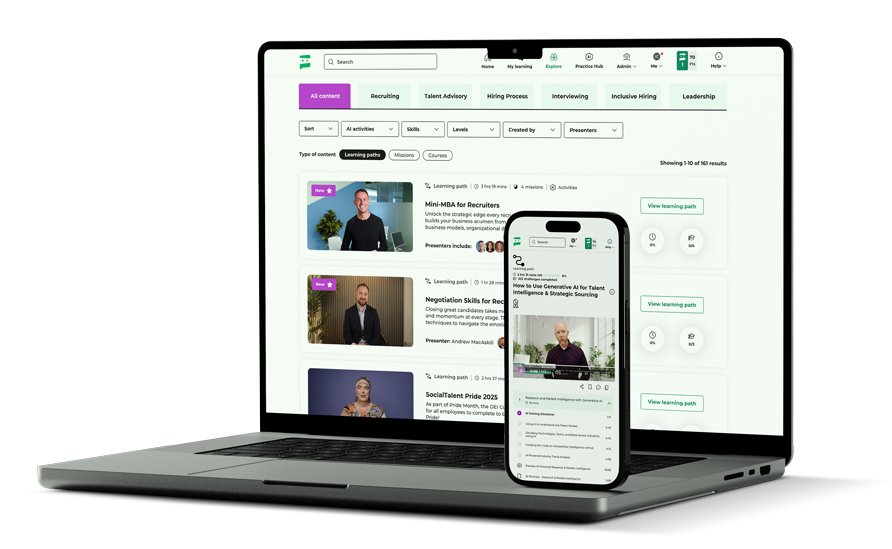
By David Deady
Hiring isn’t just a business function—it’s the cornerstone of organizational success. In today’s talent market, leading companies don’t view hiring as a task for HR alone; they weave it into the fabric of their culture. This was the central theme of SocialTalent Live: How to Create a Hiring Culture, our latest online event, where top talent acquisition experts came together to share their strategies for embedding hiring excellence across organizations.
Hosted by our very own Johnny Campbell, CEO of SocialTalent, the event featured three compelling discussions with industry leaders:
- John Vlastelica, CEO of Recruiting Toolbox
- Danielle Monaghan, SVP of Global Talent Acquisition at Expedia Group
- Nick Mailey, former VP of Talent Acquisition at Equinix.
Below, we’ll delve into the key insights and practical takeaways from each session, showcasing how organizations can create a hiring culture that transforms their approach to talent acquisition.
What Is a Hiring Culture?
At its core, a hiring culture is one where everyone—leaders, managers, and employees—takes ownership of attracting and retaining great talent. It’s a shift from viewing recruiting as HR’s sole responsibility to embracing it as a shared mission across the organization.
“When hiring managers are super engaged and see recruiting as part of their day job, you win more top talent,” said John Vlastelica during the event.
This mindset doesn’t emerge overnight. It requires deliberate effort, from defining principles and aligning stakeholders to fostering accountability and building consistency. The journey isn’t without challenges, but as the speakers highlight, the payoff is immense.
1. Setting the Stage: John Vlastelica on the Foundations of a Hiring Culture
Key Theme: A hiring culture is built on shared responsibility and high standards.
In the opening discussion, John Vlastelica drew on his extensive experience to explain how organizations can create and sustain a hiring culture.
Amazon’s Bar Raiser Program
Amazon’s Bar Raiser program is often cited as the gold standard for maintaining hiring quality at scale. This initiative, designed and scaled by John during his time there, assigns independent, highly trained interviewers (known as Bar Raisers) to evaluate candidates and facilitate hiring decisions. These trusted individuals have veto power, ensuring that only candidates who meet Amazon’s high standards are hired.
John described how this initiative helped Amazon maintain a consistent hiring culture, even as the company scaled to over a million employees. He emphasized that this wasn’t just about quality control but also about creating a system where hiring was a shared, strategic responsibility.
“The Bar Raiser program was one of Amazon’s secret weapons in scaling a high hiring bar,” John said. “It provided some decentralized accountability to make sure that we were making quality hiring decisions beyond what a recruiter, talent advisor, or hiring manager would do.”
Practical Strategies for Building Accountability
One of the most significant challenges in creating a hiring culture is holding hiring managers accountable. Many TA teams blame disengaged hiring managers for poor outcomes but fail to define what good hiring behavior looks like. John introduced his Hiring Manager Maturity Model to the audience to illustrate the spectrum of engagement levels, from passive hiring managers who disengage from the process to “talent champions” who actively drive recruiting efforts.
Steps to Establish Accountability:
- Define “Good”: Create a framework outlining the behaviors and actions expected from hiring managers. This might include sourcing candidates, providing actionable feedback, or helping close deals.
- Incorporate Metrics: Measure hiring manager performance through surveys or post-hire reviews. John even suggested flipping the script by asking recruiters to evaluate hiring managers’ performance during the hiring process.
- Embed in Performance Reviews: Make hiring outcomes a formal part of hiring managers’ evaluations. At Amazon, for example, hiring responsibilities were baked into performance reviews, ensuring managers couldn’t treat recruiting as an optional task.
“This isn’t you doing TA a favor,” John emphasized. “This is if you want to get your unfair share for top talent. You have to step up. You have to level up. You have to be more than just a passive hiring manager.”
2. From the Trenches: Danielle Monaghan on Rebuilding Hiring Cultures
Key Theme: Align hiring principles with company values to drive consistency.
As SVP of Global Talent Acquisition at Expedia Group, Danielle Monaghan faces the unique challenge of rebuilding a hiring culture within a mature organization. Despite the hurdles, she sees the company’s recent leadership changes as an opportunity to redefine its approach to hiring. The organization’s goal for 2025 is clear: rebuild a recruiting culture that aligns with its long-term business objectives and values.
Creating Tailored Hiring Principles
Danielle emphasized the importance of crafting coherent and consistent hiring principles that reflect a company’s unique values and needs. At Expedia, these principles guide both recruiters and hiring managers in evaluating candidates for not only technical skills but also cultural alignment.
“Because we have so many new leaders, people have come in bringing practices from their previous companies. And so we’re seeing almost five different recruiting practices in the business.”
Their challenge at the moment is that everyone has a different definition of what good looks like in terms of hiring. So part of Danielle’s role now is to understand all these various beliefs and synthesize a process that looks to consolidate this and create a baseline and foundation.
“These are our principals. This is who we are. This is how we hire. This is what we value. This is what we evaluate.”
And it’s unique to each company. For example, Danielle spoke of how hiring globally diverse talent is something that is embedded into Expedia’s hiring culture and is something that they make sure to specifically interview for because it is of value for the organization as a whole. But this behavior is even being modelled by their leaders and CEO to ensure there’s a top-down approach.
Hiring Manager Engagement and Expectation
Getting hiring managers to see recruiting as an integral part of their day job is a challenge and something you must factor in when trying to drive a hiring culture. “It is a change management exercise,” Danielle says. “It’s something that you have to anticipate. You have to have your launch, and your rollout, and your communications. Bring in your partners. Set and reinforce expectations.”
Training is a critical component of Expedia’s approach. Their “License to Hire” program ensures that hiring managers are trained and certified before even participating in interviews. This structured process creates consistency and fairness, reducing bias and improving decision-making.
Danielle acknowledged that creating a hiring culture is a multi-year initiative requiring buy-in at every level. But from a starting point, she recommends focusing on foundational elements:
- Clear Communication: Ensure everyone understands the “why” behind the hiring principles.
- Top-Down Support: Leadership alignment accelerates change, but grassroots efforts can still make a difference.
- Incremental Improvements: Start small, focusing on areas where you can make the biggest impact, such as interview training or hiring metrics.
3. Grassroots Strategies: Nick Mailey on Starting Small
Key Theme: Even without executive buy-in, incremental changes can create momentum.
Nick Mailey, former VP of Talent Acquisition at Equinix, offered practical advice for organizations that lack top-down support for building a hiring culture. His message was clear: start small and focus on what you can control.
The Power of a Recruiting Culture
Nick stressed that recruiting culture is about more than filling roles—it’s about acquiring exceptional talent that can redefine an organization’s trajectory.
Drawing on Steve Jobs’ adage, “A players hire A players, and B players hire C players,” Nick highlighted the network effect created when great people are brought into a company. This effect fosters collaboration, innovation, and sustained excellence across teams.
He likened this dynamic to the way high-performing groups come together in other fields, such as:
- Academia: Great minds collaborate to solve global problems.
- Art: Movements like impressionism were born from collectives of talented individuals.
- Sports: Athletes train together to push each other to peak performance.
“Excellence elevates excellence,” Nick said. “Great people create a dynamic community and culture for the company that feeds on itself. I think the opportunity for us as Talent Acquisition Leaders is to capitalise on that.”
It’s About the Journey
Nick acknowledged the daunting nature of building a hiring culture, particularly in organizations that lack mature processes or leadership buy-in. However, he emphasized the importance of incremental progress.
“How do you eat an elephant? One piece at a time.”
That’s how you start. It’s a journey to get to the end goal of having a cohesive hiring culture, so begin with small, manageable steps and build. Nick even drew parallels between TA and other professions, such as high-end culinary arts, to illustrate the pursuit of excellence. He referenced shows like Chef’s Table and The Bear, where the journey to Michelin-star recognition reflects the dedication, pressure, and operational complexity faced by TA teams. But the lesson learned:
Greatness doesn’t happen overnight. It requires a clear vision, incremental progress, and relentless focus on quality.
“It’s about the journey that these chefs have gone on to become world-renowned. They didn’t start with a Michelin star. They weren’t a finished project. It’s that pursuit of excellence. It’s always inspired me.”
Conclusion: Why a Hiring Culture Matters
A strong hiring culture isn’t just a competitive advantage—it’s essential for long-term success. Companies with engaged hiring managers, clear processes, and a commitment to excellence consistently attract and retain top talent.
As Johnny Campbell summarized:
“Great hiring isn’t just about finding people to fill roles—it’s about creating teams that drive your business forward.”
By combining top-down leadership, grassroots engagement, and a relentless focus on improvement, organizations of any size can build a hiring culture that transforms their talent strategy—and their future.




